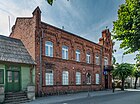Nieszawa
- View a machine-translated version of the Polish article.
- Machine translation, like DeepL or Google Translate, is a useful starting point for translations, but translators must revise errors as necessary and confirm that the translation is accurate, rather than simply copy-pasting machine-translated text into the English Wikipedia.
- Consider adding a topic to this template: there are already 1,471 articles in the main category, and specifying
|topic=will aid in categorization. - Do not translate text that appears unreliable or low-quality. If possible, verify the text with references provided in the foreign-language article.
- You must provide copyright attribution in the edit summary accompanying your translation by providing an interlanguage link to the source of your translation. A model attribution edit summary is
Content in this edit is translated from the existing Polish Wikipedia article at [[:pl:Nieszawa]]; see its history for attribution. - You may also add the template
{{Translated|pl|Nieszawa}}to the talk page. - For more guidance, see Wikipedia:Translation.

 Poland
Poland Kuyavian-Pomeranian
Kuyavian-PomeranianNieszawa (Polish pronunciation: [ɲɛˈʂava]; German: Nessau) is a town and a commune in the Kuyavian-Pomeranian Voivodeship, in north-central Poland. As of June 30, 2014, the town has a population of 1,985 people. It is located in the historic region of Kuyavia.
History

The Statutes of Nieszawa, enacted in this town at 1454, have a significance in Polish legal and social history.
Nieszawa was granted town rights in 1460, and in the following centuries it was a royal town of the Polish Crown, administratively located in the Brześć Kujawski Voivodeship in the Greater Poland Province.
Following the joint German-Soviet invasion of Poland, which started World War II in September 1939, the town was invaded and then occupied by Germany. The Germans immediately carried mass arrests of Poles as part of the Intelligenzaktion.[1] Nieszawa was one of the sites of executions of Poles carried out by Germany in 1939 as part of the Intelligenzaktion.[1][2] In December 1939, the Germans also expelled around 1,000 Poles from the town.[1] Further expulsions of Poles were carried out in 1940.[3] Houses, offices, shops and workshops of expelled Poles were handed over to Germans as part of the Lebensraum policy.[4] In 1945 the German occupation ended and the town was restored to Poland, although with a Soviet-installed communist regime, which remained in power until the Fall of Communism in the 1980s.
Sights
The most important historic landmarks and sights of the town are the Gothic Church of Saint Hedwig (High Duchess consort of Poland), built in the 15th century, which possesses rich Gothic-Renaissance-Baroque interior, the Baroque Franciscan Monastery with the Church of the Invention of the Holy Cross, the Stanisław Noakowski Museum dedicated to Polish architect and artist Stanisław Noakowski, located in his former home, and the historic market square filled with old townhouses and the town hall.
Notable people
- Stanisław Noakowski (1867-1928), Polish architect, watercolorist and art historian
- Ferdynand Antoni Ossendowski (1876–1945), Polish writer, explorer, university professor and anti-Communist activist
- Jan Woźnicki [pl] (1881-1945), Polish teacher and parliamentarian
Gallery
-
 Stanisław Noakowski Museum located in his former home
Stanisław Noakowski Museum located in his former home -
 Monument to January Uprising participants
Monument to January Uprising participants -
 Baroque Invention of the Holy Cross church
Baroque Invention of the Holy Cross church -
 Post office
Post office
References
External links

- Nieszawa's official website
- Official website of the local newspaper
- NKS Jagiellonka Nieszawa - local football club's website















